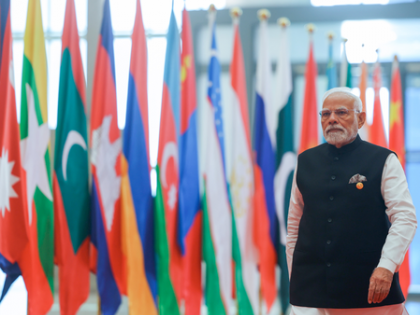India sticks to its 'clear and consistent' stance on China's controversial Belt and Road Initiative
By IANS | Updated: September 1, 2025 13:45 IST2025-09-01T13:44:04+5:302025-09-01T13:45:24+5:30
Tianjin, September 1 India on Monday once again refrained from offering support to China's controversial Belt and Road ...

India sticks to its 'clear and consistent' stance on China's controversial Belt and Road Initiative
Tianjin, September 1 India on Monday once again refrained from offering support to China's controversial Belt and Road Initiative (BRI), becoming the only nation in Shanghai Cooperation Organisation (SCO) which has refused to endorse the project.
The Tianjin Declaration by the Council of Heads of State of the SCO stated, "The Republic of Belarus, the Islamic Republic of Iran, the Republic of Kazakhstan, the Kyrgyz Republic, Islamic Republic of Pakistan, Russian Federation, Republic of Tajikistan and Republic of Uzbekistan, reaffirming their support for China's Belt and Road Initiative (BRI), noted the ongoing work on the joint implementation of this project, including efforts to align the development of the Eurasian Economic Union and the BRI."
India has refused to support China's BRI during the previous SCO Summits as well. New Delhi's position on China’s ‘One Belt One Road’ (OBOR) or ‘Belt and Road Initiative’ (BRI) has been clear and consistent.
The government led by Prime Minister Narendra Modi is of firm belief that connectivity initiatives must be based on universally recognized international norms, good governance, rule of law, openness, transparency and equality, and must be pursued in a manner that respects sovereignty and territorial integrity.
"Government continues to monitor the implications of the projects under OBOR/BRI on India's sovereignty, territorial integrity and security. Government has consistently protested to the Chinese side over the inclusion of the so-called ‘China-Pakistan Economic Corridor’ (CPEC), which passes through parts of the Indian Union Territories of Ladakh and Jammu & Kashmir under illegal occupation of Pakistan, as a flagship project of ‘OBOR/BRI’ and asked them to cease these activities," Minister of State for External Affairs Kirti Vardhan Singh had told Parliament in February, earlier this year.
In the Tianjin declaration, the member states noted the role of the SCO region in restoring the global economy, maintaining the stability of global production and supply chains, and ensuring further sustainable development. The member states expressed support for further reform of the global economic governance infrastructure.
The joint declaration reads, "The member states note the role of the SCO region in restoring the global economy, maintaining the stability of global production and supply chains, and ensuring further sustainable development. Member States support the further improvement and reform of the global economic governance architecture and will consistently uphold and strengthen an open, transparent, fair, inclusive, non-discriminatory and multilateral trading system based on universally recognised international principles and rules, which promotes the development of an open global economy, ensures fair market access and provides special and differential treatment for developing countries. The Council of Heads of Member States of the SCO adopted a statement on support for the multilateral trading system."
The SCO member states expressed opposition to unilateral coercive measures, including those of an economic nature. The joint declaration reads, "Member States oppose unilateral coercive measures, including those of an economic nature, that contravene the UN Charter and other norms of international law, the rules and principles of the World Trade Organisation, damaging the interests of international security, including its food and energy components, negatively affecting the global economy, undermining fair competition, hindering international cooperation and the achievement of the UN Sustainable Development Goals."
The member states reaffirmed their commitment to equal and full observance of the purposes and principles of the UN Charter and the SCO Charter, as well as other universally recognised principles and norms of international law in relations between SCO member states. The member state advocated respect for the right of people to independently and democratically choose their own paths of political and socio-economic development and emphasized that the principles of mutual respect for sovereignty, independence, territorial integrity of states, equality, mutual benefit, non-interference in internal affairs, and non-use of force or threat of force are the basis for the sustainable development of international relations.
The joint declaration reads, "Reaffirming their commitment to the goals and principles of the SCO Charter, the member states will continue to act in accordance with the 'Shanghai spirit,' which embodies mutual trust, mutual benefit, equality, mutual consultation, respect for cultural diversity and the pursuit of common development, and will consistently deepen cooperation in the interests of security, stability and sustainable development in the SCO region. The member states adhere to a line that excludes bloc and confrontational approaches to solving international and regional development problems. They emphasise that cooperation within the SCO can serve as a basis for the formation of an architecture of equal and indivisible security in Eurasia."
The SCO Summit is taking place in Tianjin under China's Presidency. The SCO is a permanent intergovernmental international organisation established in Shanghai on June 15, 2001. The SCO member states are: China, Russia, India, Kazakhstan, Kyrgyzstan, Tajikistan, Pakistan, Uzbekistan, Iran and Belarus. The SCO has two observer states — Afghanistan and Mongolia and 14 dialogue partners - Turkey, Kuwait, Azerbaijan, Armenia, Cambodia, Nepal, Sri Lanka, Saudi Arabia, Egypt, Qatar, Bahrain, the Maldives, Myanmar, and the United Arab Emirates.
Disclaimer: This post has been auto-published from an agency feed without any modifications to the text and has not been reviewed by an editor
Open in app